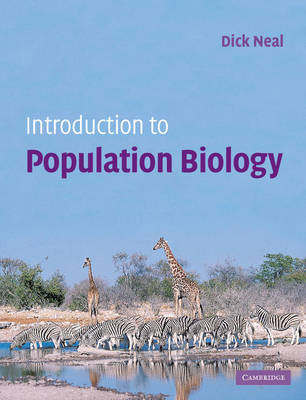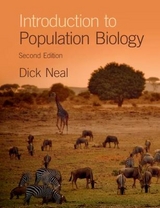
Introduction to Population Biology
Cambridge University Press (Verlag)
978-0-521-53223-5 (ISBN)
- Titel erscheint in neuer Auflage
- Artikel merken
How do plant and animal populations change genetically to evolve and adapt to their local environments? How do populations grow and interact with one another through competition and predation? How does behaviour influence ecology and evolution? Introduction to Population Biology covers all these areas and more. Taking a quantitative and Darwinian perspective, the basic theory of population processes is developed using mathematical models. To allow students of biology, ecology and evolution to gain a real understanding of the subject, key features include: • step-by-step instructions for spreadsheet simulations of many basic equations to explore the outcomes or predictions of models • worked examples showing how the equations are applied to biological questions • problem sets together with detailed solutions to help the reader test their understanding • real-life examples to help the reader relate the theory to the natural world
DICK NEAL is Professor of Biology, and Associate Dean (Science) in the College of Arts and Sciences at the University of Saskatchewan.
Preface; Acknowledgements; Glossary; Part I. Evolution by Natural Selection: 1. Darwin concludes that organisms evolve; 2. Darwin's theories of evolution; 3. Understanding natural selection; Part II. Simple Population Growth Models and Their Simulation: 4. Density-independent growth and overproduction; 5. Density-dependent growth and the logistic growth model; Part III. Population Genetics and Evolution: 6. Gene frequencies and the Hardy-Weinberg Principle; 7. Mutation and the genetic variation of populations; 8. Small populations, genetic drift and inbreeding; 9. Migration, gene flow and the differentiation of populations; 10. Quantifying natural selection: haploid and zygotic selection models; 11. Applying zygotic selection models to natural systems; 12. Polygenic inheritance, quantitative genetics and heritability; 13. Population genetics: summary and synthesis; Part IV. Demography: 14. Life tables and age-specific death rates; 15. Age-specific reproduction and population growth rates; 16. Evolution of life histories; Part V. Interactions Between Species, and the Behaviour of Individuals: 17. Interspecific competition and amensalism; 18. Predation; 19. Animal behaviour, natural selection and altruistic traits; 20. Sexual selection and mating systems; 21 Epilogue; References; Solutions to problems; Index.
| Erscheint lt. Verlag | 24.12.2003 |
|---|---|
| Zusatzinfo | 46 Tables, unspecified; 16 Halftones, unspecified; 112 Line drawings, unspecified |
| Verlagsort | Cambridge |
| Sprache | englisch |
| Maße | 190 x 247 mm |
| Gewicht | 880 g |
| Themenwelt | Naturwissenschaften ► Biologie ► Ökologie / Naturschutz |
| Technik ► Umwelttechnik / Biotechnologie | |
| ISBN-10 | 0-521-53223-X / 052153223X |
| ISBN-13 | 978-0-521-53223-5 / 9780521532235 |
| Zustand | Neuware |
| Informationen gemäß Produktsicherheitsverordnung (GPSR) | |
| Haben Sie eine Frage zum Produkt? |
aus dem Bereich



